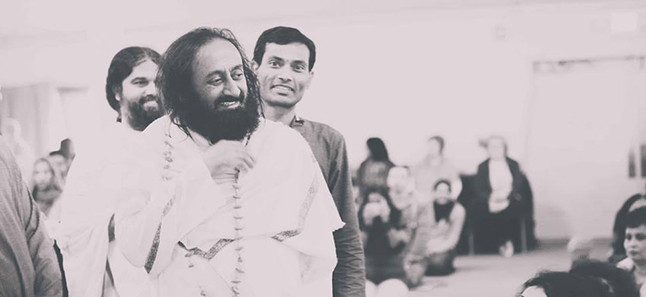
Did you all celebrate Gowri or Ganesha habba well?
During the Gowri festival, we give bhagina. What does bhagina mean? Bhagina means fortune. We share our fortune with each others with the feeling that 'We are part of your life and you are part of our life, and so we share our fortunes'.
How do we share them? In a secretive manner. As per tradition, the items are enclosed between two wicker trays, and rocked three times before offering it. What is the purpose of these wicker trays? They are to separate the heavy from the light, to sift between the wheat and the chaff. And as you do this, the chaff, flies off and the wheat settles down. In the same manner, in everyone’s lives the chaff and wheat are mixed, and the process of separating them gives us our fortune. The wicker tray that we offer is an indication of viveka, the fortune in our lives. If we do not have any viveka, then our lives are without fortune.
What do we keep inside the wicker tray? We keep whatever has been newly harvested, like rice, pulses, etc.. Getting food is our biggest and first fortune. If we do not get food to eat, that is our greatest misfortune. And so we keep whatever has been newly harvested like rice, dal (pulses), jaggery, fruits, i.e., whatever is required for our daily needs. We even keep sarees, kumkum and bangles. Thus, we need viveka and nutritious food for our existence; we offer them both. We cover the tray with the saree pallu (the loose end of a saree that is worn over the head and shoulder) and offer it secretly; we don’t make a big show when we make the offering. We do not offer it to announce who we are or how great we are, nor to show that the other person is smaller. We offer it because the person who is receiving is doing so with a big heart, and so we offer it as our duty. We don’t offer it thinking that this will give us merit. Vadhagodhu is also known as bhagina; thus, both, to offer and to receive the bhaginas. This is the significance of celebrating the Gowri festival.
Yes, Shankaracharya has depicted the forms of Lord Ganesha very beautifully. If you read the Ganesha Atharvashisha (Upanishad), you will know of many forms of Lord Ganesha.
Ganesha is present in all directions, in every possible form - the Earth, Air, Sun, Moon, in every form of nature. You are Brahma, Indra, Shiva, Rudra etc., they are all in your form. You can see the form of paramatma (Supreme Being) in one God, the formless in one form - this is known as meditation.
We recite the Ganesha Stotram –Shuklam Baradaram Vishnum, Shashivarnam Chaturbhujam, Prasanna Vadanam Dhyaayeth, Sarva Vighno Pashantaye. This does not have the name of Ganesha at all!
Shuklam Baradharam means the one who is dressed in white, the one who is pure. Vishnum means that he is at the very core of our being.
Shashivarnam means milky white like the full moon, cool like the moon that soothes us, and it has the rays of brightness. (There are two types of brightness, one like the sun that can hurt our eyes, and the other is so soothing that we can keep on looking at it.) Chaturbhujam, bhuja means shoulders that can bear weight, while chatur means cleverness or intelligence, which together means - one who can bear the burden easily.
Prasanna vadhanam dhayeth means that if you meditate on the one whose face is so peaceful, pleasant and remember them, you feel instantly uplifted. Sarva vighno pashantaye, then that one will give you the strength in the mind to overcome all obstacles.
This is not just for Ganesha, it is also related to Vigneshwara, but the most important part in this shloka is about the One who is present everywhere.
If you think God is angry with you, if you feel that you have committed a mistake and feel distant from him; or if you feel that God is always happy and content with you, then you develop a relationship with him.
Many times people say that you are angry with us, as if I don’t have any other work. You make a mistake and I get angry! Why should I get irritated if you make a mistake? Why will a Guru get angry? A Guru is always happy. I feel compassion if you make a mistake.
I feel, "Oh my God, why is he putting himself through so much hardship?" That is why if you think of something pleasant, remember a pleasant face, you get strength! When we think of something pleasant in our mind, the fear of the unknown goes away, we get strength to overcome the obstacle.
What is the form of Ganesha?
Ajam nirvikalpam means someone who was not born.
Nirakaram ekam - you have no form, you are the only one, and there is no one else. Nirananda mananda madhvaita poornam - you are happiness. you are the only one, the whole world is in your form.
The shloka continues with Param nirgunam nirvisesham niriham para brahma roopam ganesham bhajemam, you are the form of the parabrahma, you are present everywhere, you have the chaitanya shakti, the scintillating energy, I meditate on you in my mind.
Let us take vairagya to mean contentment. Whenever you are content, that is vairagya. If you have had a full meal, and someone brings more food, you will say, "No I am full", that is vairagya. You cannot exist without vairagya. Just as you breathe in, at some point, you have to breathe out. Breathing in is raga, passion, and breathing out is vairagya, dispassion. Breathing in is passion and breathing out is dispassion, and both are essential in life.
Come on, wake up! All that happened in the past is finished, it is like a dream, it is done! You did something wrong and you learnt a lesson from it, it is finished. Now, move on. Broaden your vision, and don’t worry about doership and non-doership. Leave all that.
Often, people have two tendencies, one for themselves and another for others. An elephant also has two tusks, one for showing and the other for chewing. It never shows the one it uses for chewing, and it never uses the one it shows for chewing. Similarly, people have two tendencies, they do not show who they are and they are not what they show. But Ganesha is not like that, it is Ekdanta, which has many meanings; danta means the one who gives, he is the only daata, giver. Ekadanta can also also mean someone who has one target, lakshya, and one face. All these qualities are focused into one, ekadanta.
Make a start with the spine being erect, then if the head comes down, the back bends, don’t bother about it. You cannot start meditation in a sleeping posture, because then you will be snoring very soon. So sit down, and start with the spine erect when you meditate, and then let go, let it happen.
There is a song in Kannada which has a very profound meaning. When you are in a garden, in the midst of flowers, then the state of your mind is completely different. If you are in the midst of people, your state of mind is very different - sometimes the emotions of passion, anger, hatred come up. But when you are in the garden, amongst flowers, such emotions will not come up; there will be no feelings of jealousy, no emotional upheaval, nothing of the sort. But if you are in the midst of people, then definitely all this will happen. However good your friends are, when you spend time with people, something or the other comes up. You cannot always live in the midst of people, nor can you live alone in a garden.
Sometimes you have to spend time dreaming, and sometimes you have to listen to music, you cannot be in one state. There are people who work all the time, doing accounts or something or the other. The radio may be playing in the background but they do not pay attention to it; they keep thinking of something else. This is being in an imbalanced state. Who is a balanced person? A person who is sometimes in music, sometimes working; such a person thinks like a scientist, and looks at the world in a scientific manner; sometimes enjoys music, sometimes science and art. You must spend your life in both these streams.
Sometimes you must live in the world, and sometimes in silence. Go with these two and you will experience Brahman. You cannot run away from your responsibilities and go to the Himalayas, or stay in the worldly aspects all the time; you must strike a balance between both and experience the Brahman within you.






























